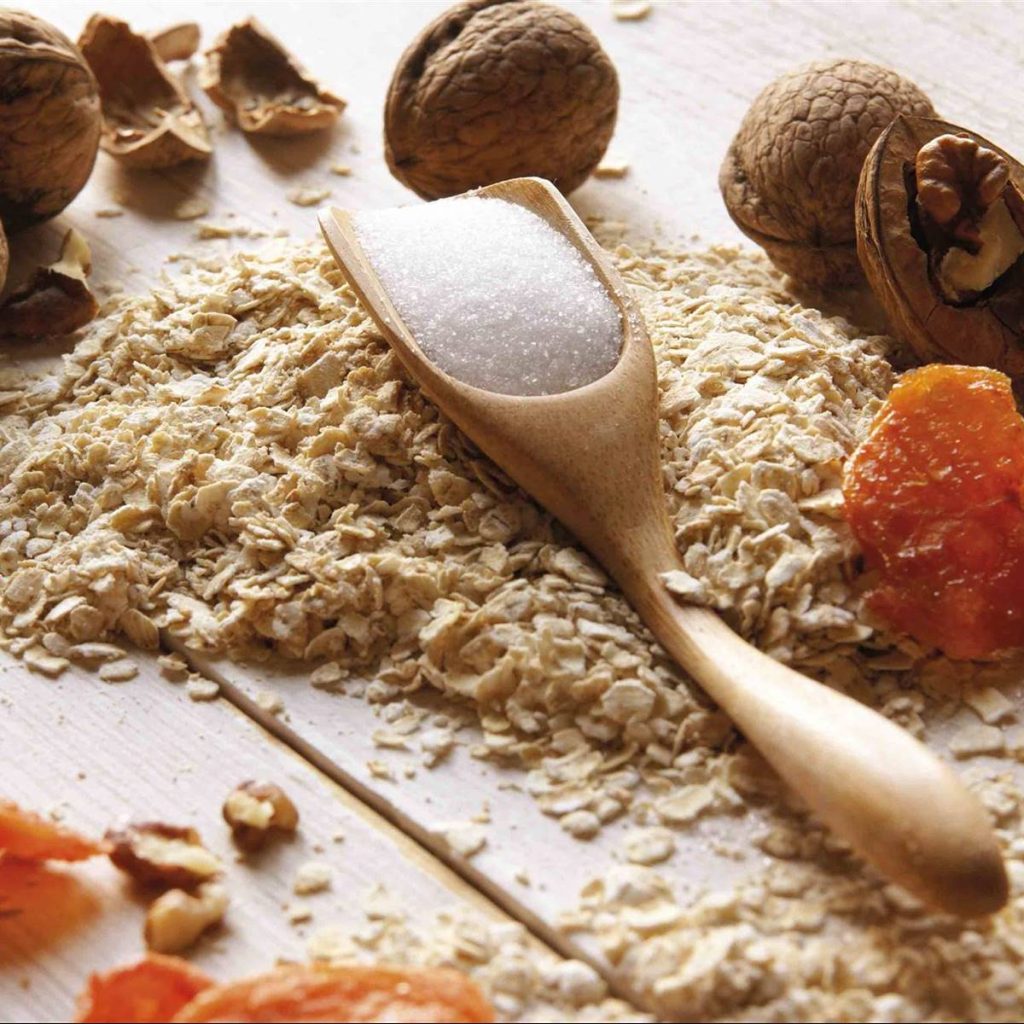For those who want to sweeten their desserts and drinks but don’t want to turn to sugar, erythritol may be an option. Know well the properties of this sweetener and do not abuse it.

Many people find it difficult to give up the sweetening power of sugar, either to accompany coffee and infusions or for desserts and pastries, and so they look for alternatives. Erythritol is a sweetener that can be used to replace sugar.
We tell you what this sweetener is, its properties, its uses and also its contraindications and possible health risks of taking it.
1. WHAT IS ERYTHRITOL?
Erythritol is a sweetener that belongs to the family of sugar alcohols called polyols and forms naturally in some fruits and fermented foods.
The body does not assimilate it at the intestinal level, so it is healthier than other synthetic alternatives. And since it does not provide calories, it does not increase blood sugar levels.
2. DOES IT HAVE HEALTHY PROPERTIES?
Unlike other polyols, such as xylitol or maltitol, it has the advantage that it is better tolerated in the gut and does not alter the microbiota. On the contrary, in adequate doses it can serve as a prebiotic to feed the bacteria of the intestine. Anyway, it should be avoided if you suffer from any intestinal pathology.
Erythritol is used in light products, but keep in mind that, in general, these are not recommended. When sweet foods are consumed, the brain waits for the arrival of substances to produce calories and energy that do not arrive. Therefore, eating products with sweeteners can produce more need to eat sweet.
From my point of view, it is best to use natural sweeteners and encourage the taste buds to adapt to a less sweet taste. You can use fruit, syrups, coconut sugar …, although none is caloric and it is not advisable to abuse.
3. WHERE IS ERYTHRITOL OBTAINED FROM?
Erythritol is produced industrially through a natural process of glucose fermentation that is extracted from the starch of corn or wheat, by the action of a yeast called Moniliella Pollini’s, among others. To find out if a product contains erythritol, the reference E-968 must be searched among the components of the label.
4. ARE THERE FOODS RICH IN ERYTHRITOL?
Of course. Some fruits contain small amounts of this substance naturally, such as grapes, watermelon, melon, pear or peach. It can also be found in some mushrooms, such as mushrooms, and in some fermented products, such as soy sauce, wine or cheese.
5. WHAT IS THE MAXIMUM RECOMMENDED DOSE?
It should not be consumed above 50 g per day. Although it is quickly absorbed in the small intestine, it passes into the blood and is eliminated in the urine, that is, it does not ferment because it does not reach the large intestine. If taken in excess, it can cause gas, discomfort, nausea, etc.
6. IN WHAT CASES IS ITS CONSUMPTION ESPECIALLY ADVISED?
For diabetics it is a healthy choice, since it does not cause an increase in blood glucose or the creation of insulin. Also, some studies have concluded that erythritol acts as a protector against caries if consumed for a long time.
7. IS IT TRUE THAT IT IS ANTIOXIDANT?
In diabetic rats it was seen that its consumption had a protective effect on the endothelium of the aorta artery. Similarly, a study with people with type 2 diabetes showed that its sustained consumption improved endothelial function, reducing arterial stiffness.
8. DO YOU HAVE ANY CONTRAINDICATIONS?
In general no, but being a synthesized product, the body does not recognize it as a nutrient. It is advisable to consume it in homemade preparations and avoid light processed products, which can carry other harmful substances. In my opinion, it is preferable to use it occasionally.
It should be borne in mind that recently researchers in Nature Medicine have presented the results of research suggesting that the sweetener erythritol could increase the tendency of blood to form clots, which would increase the risk of stroke and heart attacks in people with cardiovascular disorders. To carry out the research, data from more than 4,000 patients in the United States and Europe have been analyzed. Therefore, in case of suffering any cardiovascular alteration, the most prudent thing seems not to take this sweetener until we know if it poses a risk.
The results obtained have led those responsible for this study to ask that the effects of this and other sweeteners on health be thoroughly investigated.
9. IS IT RECOMMENDED TO MIX WITH OTHER SWEETENERS?
Due to its molecular composition, erythritol has some bitterness, as well as a slight cooling effect in the mouth when dissolving, so it is advisable to mix with stevia. If it is done with the natural thickener xanthan gum, more fluffy textures will be obtained.
10. HOW CAN REFINED SUGAR BE REPLACED BY ERYTHRITOL?
Erythritol only has 70% of the sweetness of sugar, so it is slightly less intense. For this reason, when you want to replace the refined sugar of the preparations, it is necessary to add a slightly larger amount than indicated in the recipe.


